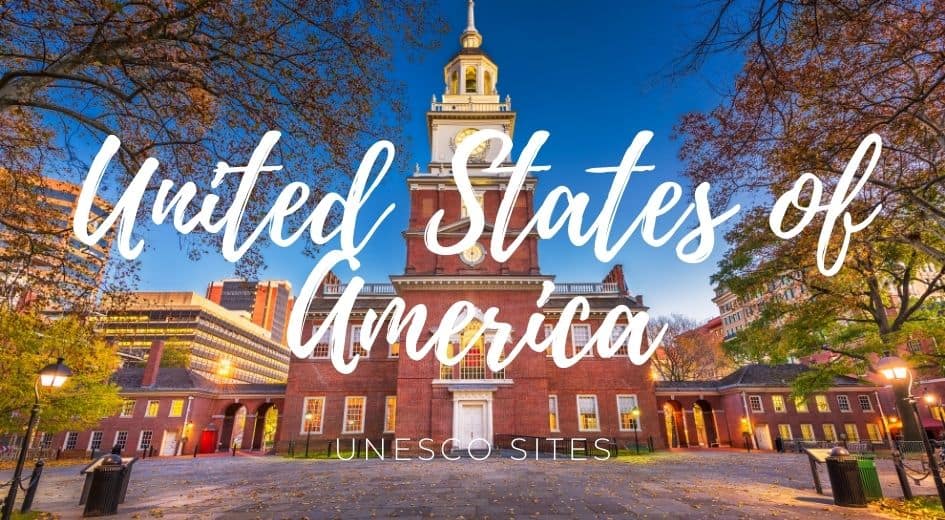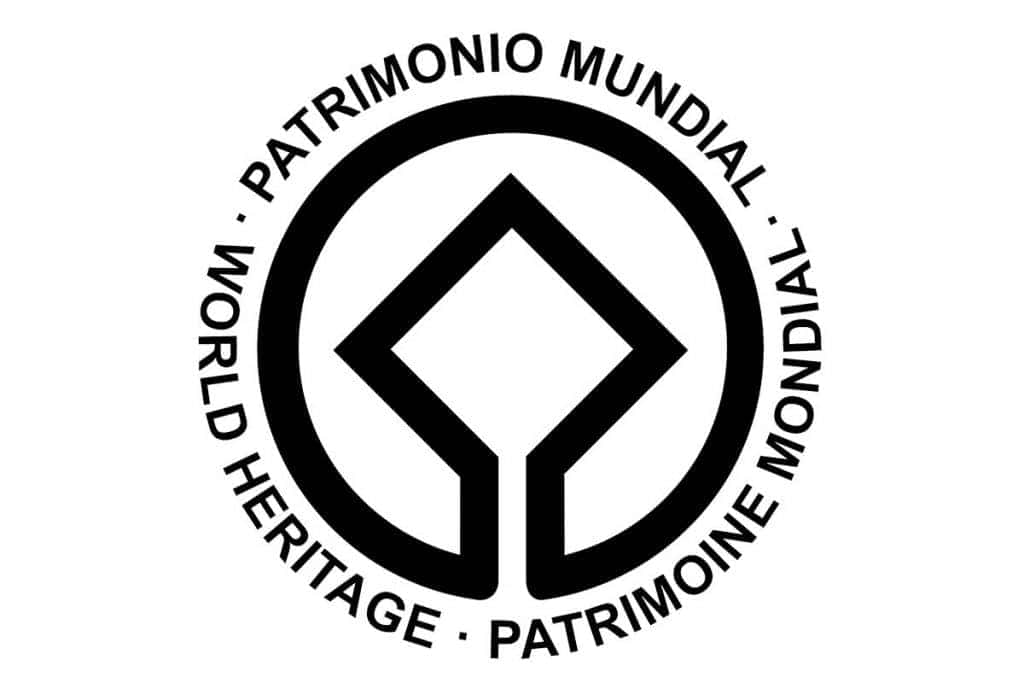Table of Contents


United States of America UNESCO has registered 24 sites on the World Heritage list and 19 on the tentative list.
Some places are so interesting that it’s relevant to keep them for future generations. This is why UNESCO has built a list of crucial classified properties in which superb places stand out for their aesthetic, natural, artistic, or cultural significance.
More than a thousand places are registered as Unesco’s World Heritage worldwide. Due to my interest in visiting World Heritage sites, I compiled the UNESCO list in the United States of America and the corresponding map.
United States of America UNESCO list
- Cahokia Mounds State Historic Site
- Chaco Culture
- Independence Hall
- La Fortaleza and San Juan National Historic Site in Puerto Rico
- Mesa Verde National Park
- Monticello and the University of Virginia in Charlottesville
- Monumental Earthworks of Poverty Point
- San Antonio Missions
- Statue of Liberty
- Taos Pueblo
- The 20th-Century Architecture of Frank Lloyd Wright
- Carlsbad Caverns National Park
- Everglades National Park
- Grand Canyon National Park
- Great Smoky Mountains National Park
- Hawaii Volcanoes National Park
- Kluane / Wrangell-St. Elias / Glacier Bay / Tatshenshini-Alsek
- Mammoth Cave National Park
- Olympic National Park
- Redwood National and State Parks
- Waterton Glacier International Peace Park
- Yellowstone National Park
- Yosemite National Park
- Papahānaumokuākea
United States of America UNESCO Map
Click on the blue pins to view more relevant information about each World Heritage site in the United States of America.
Description
- Cahokia Mounds State Historic Site: A pre-Columbian archaeological site in Illinois that was once the center of the largest indigenous civilization north of Mexico.
- Chaco Culture: A collection of ruins in New Mexico that were once the center of a major pre-Columbian civilization.
- Independence Hall: A historic building in Philadelphia that played a key role in founding the United States.
- La Fortaleza and San Juan National Historic Site in Puerto Rico: A fortress and historic district in San Juan that reflects the city’s colonial past and strategic importance.
- Mesa Verde National Park: A park in Colorado that contains some of the best-preserved examples of ancient Puebloan cliff dwellings.
- Monticello and the University of Virginia in Charlottesville: A historic estate and university founded by Thomas Jefferson, reflecting his contributions to American architecture and education.
- Monumental Earthworks of Poverty Point: A complex of prehistoric earthworks in Louisiana that reflect the ingenuity and social organization of the people who built them.
- San Antonio Missions: A group of Spanish colonial missions in Texas that reflect the blending of European and indigenous cultures.
- Statue of Liberty: A symbol of freedom and democracy on Liberty Island in New York Harbor.
- Taos Pueblo: A Native American Pueblo in New Mexico continuously inhabited for over a thousand years.
- The 20th-Century Architecture of Frank Lloyd Wright: A collection of buildings designed by the famous architect that reflect his innovative and influential approach to architecture.
- Carlsbad Caverns National Park: A New Mexico park with a vast network of underground caves and unique geological formations.
- Everglades National Park: A park in Florida that contains a unique and fragile ecosystem of wetlands and mangroves.
- Grand Canyon National Park: A park in Arizona that features one of the world’s most iconic natural landmarks and diverse geological formations.
- Great Smoky Mountains National Park: A park in Tennessee and North Carolina that contains a rich biodiversity of plant and animal species and a variety of scenic landscapes.
- Hawaii Volcanoes National Park: A park on the Big Island of Hawaii that contains two active volcanoes and unique geological features.
- Kluane / Wrangell-St. Elias / Glacier Bay / Tatshenshini-Alsek: A transboundary park system in Alaska and Canada that contains some of the world’s largest non-polar icefields and diverse ecosystems.
- Mammoth Cave National Park: A park in Kentucky that contains the world’s longest-known cave system.
- Olympic National Park: A park in Washington with a unique blend of temperate rainforest, alpine peaks, and coastal beaches.
- Redwood National and State Parks: A collection of California parks containing some of the world’s tallest trees and unique coastal landscapes.
- Waterton Glacier International Peace Park: A transboundary park system straddles the Canada-US border and contains some of North America’s most scenic mountain landscapes.
- Yellowstone National Park: A park in Wyoming, Montana, and Idaho that contains the world’s largest collection of geysers and a variety of wildlife species.
- Yosemite National Park: A park in California that features iconic natural landmarks such as Half Dome and Yosemite Falls and a range of scenic landscapes.
- Papahānaumokuākea: A marine national monument in Hawaii, one of the world’s largest protected areas and home to diverse marine species.
UNESCO World Heritage Sites in United States of America have protected places for their cultural and natural importance.
Sites on the Tentative List
- Civil Rights Movement Sites
- Dayton Aviation Sites
- Hopewell Ceremonial Earthworks
- Thomas Jefferson Buildings
- Mount Vernon
- Serpent Mound
- Okefenokee National Wildlife Refuge
- Petrified Forest National Park
- White Sands National Monument
- Brooklyn Bridge
- Ellis Island
- Central Park
- Early Chicago Skyscrapers
- Pacific Remote Islands Marine National Monument
- California Current Conservation Complex
- Marianas Trench Marine National Monument
- Marine Protected Areas of American Samoa
- Big Bend National Park
- Moravian Church Settlements


